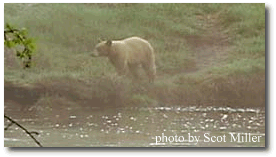| Natural History | Bears | Food Storage | Wildlife Safety |
Yosemite Black Bears and their Management
Yosemite National Park is the home of a large and healthy bear population. Unfortunately, their natural behavior, foraging habits, distribution, and numbers have been altered by access to human food in the park. Bears habituated to these unnatural foods all too often lose their instinctive fear of humans. They become aggressive and can cause extensive damage to motor vehicles, trailers, tents, ice chests, and other camping equipment while searching for human food.
Research Management decisions affecting the bear population must be based on sound biological and ecological information. An intensive research program was initiated in 1974 to gain information on the food habits, movements, and birth rates of Yosemite black bears. Human/black bear interaction and the effectiveness of aversion conditioning were studied in 1978. Research evaluating the effects of the bear management program on the sex and age composition and reproductive rates of black bears was completed in 1990. Such information is vital for formulating and updating programs designed to restore, preserve, and maintain a natural black bear population. The result of these programs may be that the park visitors will see fewer bears in developed areas, but a healthy, natural population of truly wild black bears will exist as they have for thousands of years - an integral part of the natural ecosystem.
|
http://www.nps.gov
File created 9/99 Hayes Roberts
Updated
Yosemite National Park Division
of Interpretation